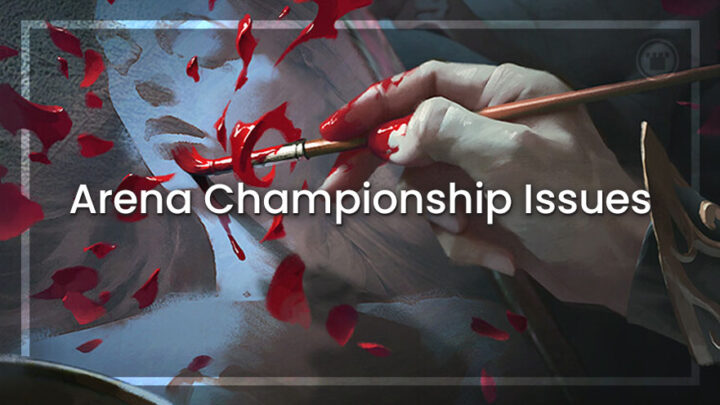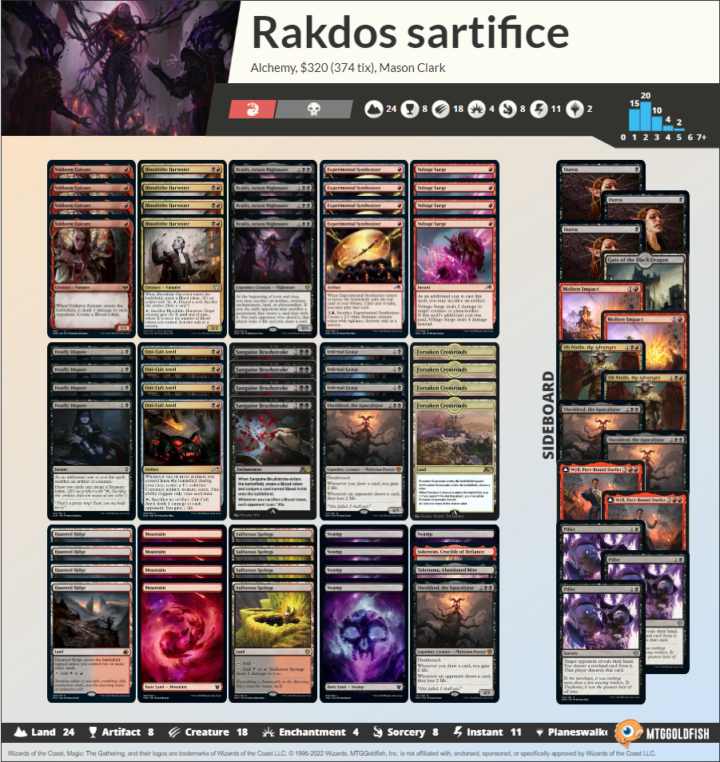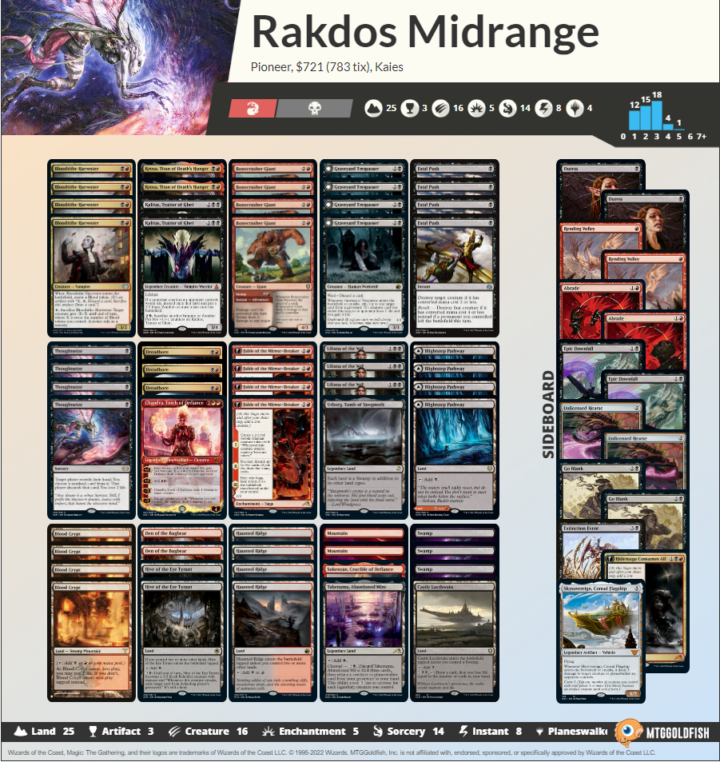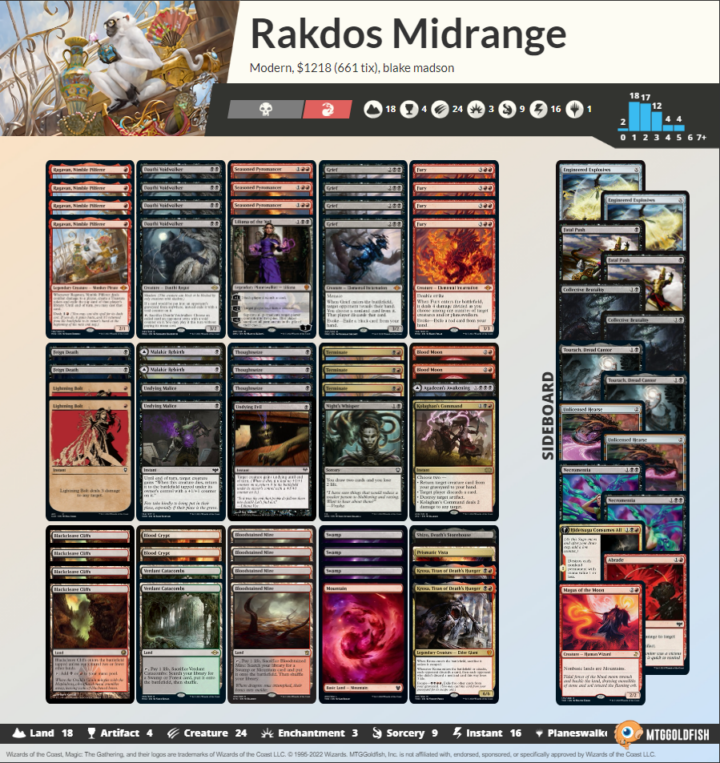This past weekend Wizards of the Coast held a huge tournament: the first Arena Championship. It featured some of the best players in the world — with names like Shōta Yasooka and Sam Rolph — who battled it out for $200,000 dollars in prizes.
When looking at the event from the outside, it had everything needed to be a spectacle for fans:
- Some of the best players in the world are battling it out? Check.
- Large prize pool to motivate players? Check.
- Easy to follow digital client? Check
- Some of the best caster talent in Cedric Phillips and Mani Davoudi? Check
So, why are we talking about it today? The format.
Finding the formula
Despite a newly rotated Standard format, this past weekend’s tournament played MTG Arena’s digital only format, Alchemy — one that hasn’t received its new cards for Dominaria United, yet. This presented some problems right away.
On one hand, you have Alchemy, which is full of unique and interesting cards to say the least. It’s a format that many had high hopes for when first announced, but it has since become one where its passionate playerbase doesn’t overlap much with competitive players.
On the other hand, we have Dominaria United Standard. While that format does seem dominated by black midrange decks right now, there hasn’t been any pressure on players to break through this perceived metagame. That’s something we always see before big events like Arena Championships or Pro Tours.
Standard is also a format that is about to be in the spotlight, since the second Regional Championship of the 2023 season will feature the format. That event is still far away, but as we saw with Pioneer and the first Regional Championship cycle, players will still dive into preparing months ahead of time to be as polished as possible.
Do you see the problem? With Standard at its most unexplored and heavy focus on the format just about to begin, Wizards of the Coast decided this Arena Championship should play Alchemy. It just feels like a missed opportunity.
Try to Follow Along
The other issue with Alchemy is it’s not very viewer friendly. Magic is already a very complex game, and it may seem easy to brush off extra complexity of Alchemy as a minor hiccup when compared to the knowledge it takes to follow regular coverage.
However, the fact that some single cards have up to six different versions pushes that required knowledge to new levels. Plus, Magic’s classic adage of “reading the card explains the card” doesn’t hold true in Alchemy. Let’s look at an example card.
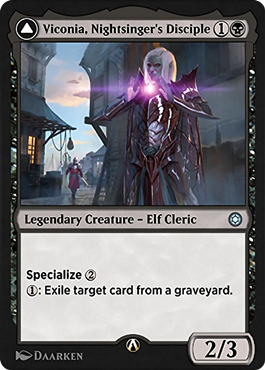
Viconia, Nightsinger’s Disciple uses the Specialize mechanic. Note that there is no reminder text for Specialize despite there being plenty of room for it. So, if you’re reading Viconia for the first time, ask yourself a question: What does activating Specialize do? If you read this card, all you know is it costs two generic mana to make something happen.
Except, that is not all you need to do to activate this mechanic. You have to also discard a land or spell card. Then, depending on the color identity of the spell you discard or the mana that land could produce, you get a different result.
That means this one card becomes up to five additional cards depending on how you built your deck. Plus, each version of Viconia comes with its own paragraph of ability text.
This complexity can create different experiences for viewers every time the card is played. Seeing this card do its thing doesn’t necessarily teach someone how it will function again in the future. Magic already struggles with that at times, but mechanics like Specialize stretch that problem to the breaking point.
This then begs the question of how many times casters should explain this mechanic. Do they just do it in the early rounds, or should they keep repeating it as viewership climbs near the end of the event? Who is it more important to consider — the enfranchised viewers who might get annoyed by repetitive explanations or the new viewers who need them?
Regardless, we know this Alchemy event led to much lower viewership than possible for an event as important as an Arena Championship. These are supposed to be the big, competitive tournaments on Arena that get players excited to play Magic. Instead, more people turned out to watch streamers playing other formats where the stakes were significantly lower.
Do as I do
Tournaments driving people to go play Magic after watching is also a key purpose of events like the Arena Championship. After all, aside from giving fans of the game a competitive outlet, these events are effectively marketing the fun of Magic to viewers.
It’s very common for players to try and duplicate what they saw tournament players doing, which often requires spending money on cards (what Wizards needs to keep the game going). However, Magic has always been an expensive, luxury hobby, where competitive decks can cost anywhere between hundreds of dollars to thousands.
As a result, playing multiple formats can be challenging if the cards don’t port easily from one to another. For example, Rakdos Midrange has some overlap in both Modern and Pioneer, meaning someone who can afford a handful of extra cards can enjoy both formats. That’s why many players pick a playstyle and stick with it.
In the case of MTG Arena, it’s no secret the game’s economy makes starting from nothing a bit rough. Even if you simply took a break from playing, falling behind on your collection can make it hard to duplicate what you see in an event. Basically, doing that is often only reasonable if you have been building your collection by grinding drafts or playing since the beginning.
And if you just want to spend actual money to simply buy the wildcards you need to assemble the deck you saw during a tournament, it’s going to cost hundreds of dollars for a product that can’t be exchanged like real, paper cards.
Ultimately, the secret to paper magic and formats like Modern is the expensive cards that make up your deck can be thought of as an investment, since it’s possible to re-sell what you previously purchased.
While you rarely make a profit off the cards, you’re often able to recoup a significant amount of what you paid to get them. This makes the continuous big purchases needed to play at a higher level possible.
At the same time, since getting into Alchemy is such a tall ask, are these events even the best way to encourage Magic players to buy new product? Wouldn’t it make more sense to encourage players to get involved with a more accessible format?
Meeting a need
Beyond the complexity of the cards, a viewer’s ability to understand them and the cost of competing in a format like Alchemy, there’s one more question to consider. Are Alchemy events what competitive players really want?
Alchemy deserves a place in Magic as a format players can enjoy, but is shoehorning it into the highest level of competition the best way to show it off? I think doing so does Alchemy a disservice while wasting effort by pushing it at the wrong target audience.
Of course, pushing these supplemental products on competitive players is becoming a bit of a trend these days. Regardless of whether we see sets designed for competitive environments, (like Modern Horizons) or not (like Unfinity), players end up divided when cards are interjected outside the usual pipeline.
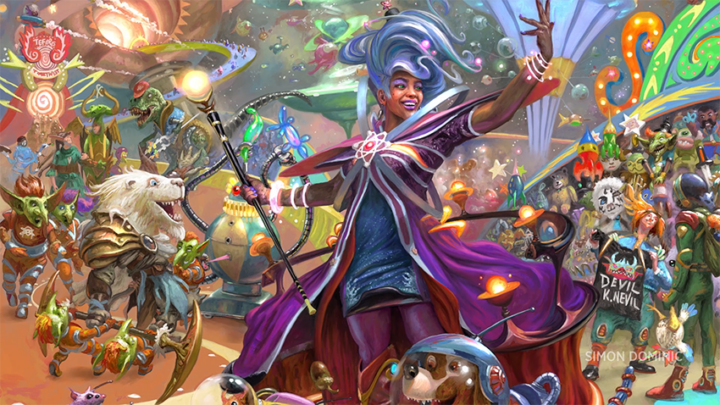
It’s easy to say, “Well, this is to help sell cards. They are a business,” in response to the question of these extra cards. And while that statement isn’t inherently wrong, we have seen that these sets are often appreciated more by casual and Commander players. In fact, Mark Rosewater has said the reason we have black border cards in Unfinity is so commander playgroups don’t have to argue over whether a silver bordered card is legal or not.
That’s a very noble and honestly reasonable goal. However, you don’t need to make them legal in Legacy just so Commander players can have access to them. After all, while the competitive player base is a bit fickle, they ultimately just want to chain events together that they can be proud to win.
The Regional Championship and Pro Tour systems are great examples of this. They haven’t caused any of the issues discussed above, all while letting Wizards of the Coast advertise their game in a way that appeals to the people watching and participating.
I love Magic in both its competitive and casual forms. It’s my favorite game, and I want it to succeed. However, I also can’t help but feel decisions like playing Alchemy for an Arena Championship are doing a disservice to every party involved. These important events can be better, and everyone involved — from the players, to the viewers to Wizards of the Coast — all deserve that.

Mason Clark is a grinder in every corner of the game who has played at the pro level and on the SCG Tour with Team Nova. Whether he’s competing in Standard, Historic or Modern, Mason plays with one goal in mind: to be a better player than he was the day before. Check out his podcast, Constructed Criticism, and catch his streams on Twitch.

